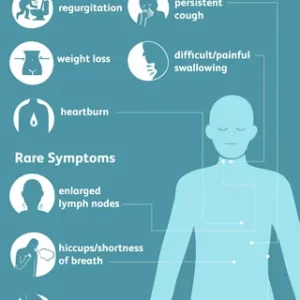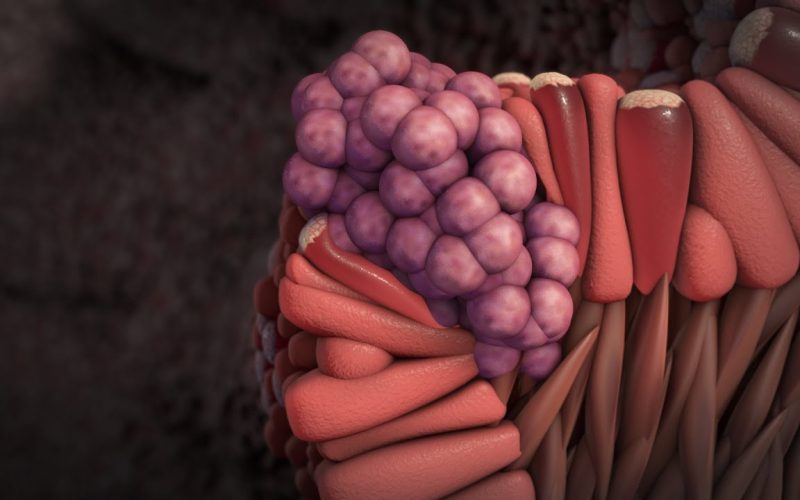What is Esophageal Cancer?
Esophageal cancer is a prevalent global health concern, ranking 10th among the most common cancers. It originates in the tissues of the esophagus, the long muscular tube responsible for transporting food from the throat to the stomach. Detecting esophageal cancer in its early stages is crucial for effective treatment. Healthcare providers employ various strategies, including surgery, chemotherapy, and radiation therapy, to manage this condition.
How Esophageal Cancer Affects the Body
Esophageal cancer’s impact on the body begins when cancerous cells in the esophageal tissues multiply, forming tumors. The aggressive nature of this cancer often means symptoms are not noticeable until the disease has progressed significantly. As the tumor grows, it obstructs the esophagus, leading to symptoms like difficulty swallowing and throat pain. There are two primary types of esophageal cancer:
- Adenocarcinoma: This is the most common type in the U.S., affecting the lower part of the esophagus and developing in the mucus-producing tissue.
- Squamous Cell Carcinoma: Found in the upper and middle parts of the esophagus, this type begins in the squamous cells lining the organ.
Is There a Cure for Esophageal Cancer?
While surgical intervention can effectively remove small tumors, unfortunately, only 25% of individuals receive a diagnosis before the cancer spreads. Esophageal cancer predominantly affects men aged 60 or older, with varying risks based on ethnicity and gender.
Symptoms and Causes
Identifying esophageal cancer symptoms is vital for early detection and prompt treatment. Symptoms include:
- Difficulty Swallowing: Often the initial symptom.
- Throat or Back Pain: Behind the breastbone or between the shoulder blades.
- Vomiting or Coughing up Blood: Indicates potential complications.
- Heartburn: Persistent heartburn may be a precursor.
- Hoarseness or Chronic Cough: Alarming signs.
- Unintentional Weight Loss: May occur due to difficulty eating.
Several risk factors contribute to the development of esophageal cancer:
- Tobacco Use: Both smoking and smokeless tobacco increase risk.
- Alcohol Use: Chronic or heavy alcohol consumption is a significant risk factor.
- Obesity: Excess weight may lead to inflammation in the esophagus.
- Barrett’s Esophagus and Chronic Acid Reflux: Changes in esophageal cells from untreated acid reflux elevate risk.
- Human Papillomavirus (HPV): HPV infection can cause tissue changes in various body parts, including the esophagus.
- History of Cancer: Previous neck or head cancer increases the risk.
- Other Disorders: Conditions like achalasia and tylosis are linked to esophageal cancer.
- Occupational Exposure: Prolonged exposure to certain chemicals, such as dry cleaning solvents, raises the risk.

How Quickly Does Esophageal Cancer Progress?
Esophageal cancer progresses rapidly due to the esophagus’s flexible nature, adapting to tumor growth without immediate symptoms. This rapid progression often leads to delayed symptom recognition until the cancer has advanced.
Diagnosis and Tests
Healthcare providers use a combination of assessments to diagnose esophageal cancer:
- Barium Swallow: X-ray imaging of the esophagus after drinking a barium solution.
- Computed Tomography (CT) Scan: Provides detailed images to assess tumor spread.
- Esophagogastroduodenoscopy (EGD): Uses a flexible tube to inspect the esophagus.
- Esophageal Endoscopic Ultrasound: Sound waves create images, often performed alongside EGD.
- Biopsy: Tissue sample examination during EGD for cancer cell confirmation.
Staging and grading are critical for treatment decisions, considering factors like tumor location, depth, lymph node involvement, and distant organ spread.
Management and Treatment
Esophageal cancer treatment strategies vary based on the cancer stage and grade:
- Surgery (Esophagectomy): Common for early-stage cancer, involving removal of the esophagus and surrounding tissues.
- Radiation Therapy: Targeting cancer cells with radiation, often used before or after surgery.
- Chemotherapy: Killing or inhibiting cancer cell growth through drugs.
- Endoscopic Submucosal Dissection (ESD): Used for very early-stage cancer.
- Endoscopic Mucosal Resection (EMR): Removes tumors in the mucous lining.
- Endoscopic Laser Therapy: Eases symptoms caused by tumor blockage.
- Photodynamic Therapy (PDT): Destroys tumors with light-activated drugs.
- Targeted Therapy: Targets specific proteins like HER2 in certain esophageal cancers.
- Immunotherapy: Enhances the immune system’s response to cancer cells.
Prevention
Reducing the risk of esophageal cancer involves adopting a healthy lifestyle:
- Maintain a Healthy Weight: Achieve and sustain a weight appropriate for your body.
- Avoid Tobacco and Excessive Alcohol: Both are significant risk factors.
- Screening for Certain Conditions: Individuals with Barrett’s esophagus may undergo screening.
- HPV Vaccination: Consult with healthcare providers about the HPV vaccine.

Outlook/Prognosis
Prognosis depends on factors like overall health and early diagnosis. Approximately 46% of individuals diagnosed with early-stage esophageal cancer survive five years post-treatment. For advanced cases, healthcare providers focus on palliative care to enhance quality of life, manage symptoms, and provide comfort. Explore more health problems
Living With Esophageal Cancer
Post-surgery, managing side effects like nausea and difficulty eating is crucial. Individuals may experience issues such as difficulty eating or dumping syndrome, a condition where the stomach cannot hold food for proper digestion. Reducing the risk of cancer recurrence involves lifestyle adjustments:
- Limit Alcohol: Frequent alcohol consumption increases the risk of recurrence.
- Quit Tobacco: Smoking is a significant risk factor recurrence.
Understanding and addressing these factors empower individuals to navigate life with esophageal cancer effectively, seeking support for managing side effects and adopting a healthy lifestyle.












